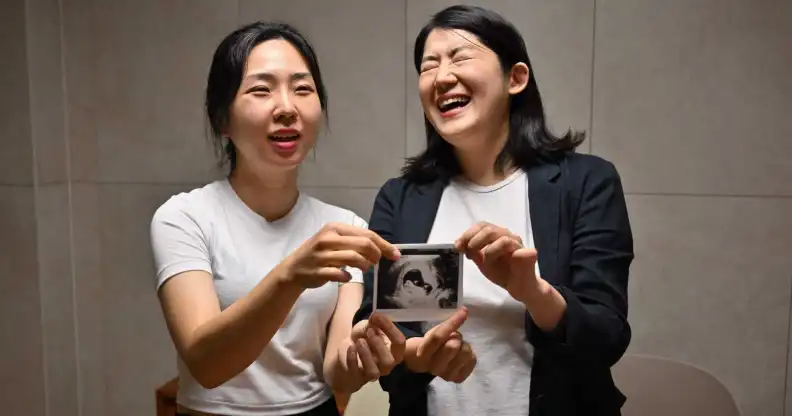South Korea: Lesbian couple welcomes child in historic first

Couple Kim Kyu-jin and Kim Sae-yeon became proud parents to their daughter Rani in historic first for South Korea’s LGBTQ+ community. (Getty Images)
A lesbian couple in South Korea have welcomed their first child via IVF in a historic milestone for the country’s LGBTQ+ community.
Couple Kim Kyu-jin and Kim Sae-yeon became proud parents to their daughter Rani on 30 August, with Kyu-jin making history as the first openly gay Korean woman to give birth, the Korea Herald reported.
While South Korea has not yet legalised same-sex marriage, and sperm banks in the country are only accessible to heterosexual married couples, the pair were able to tie the knot in New York in 2019, and receive IVF treatment in Europe.
While Kyu-jin was working in France, the country experienced a shortage of sperm donors, so the couple opted to undergo IVF in Belgium.
“I wanted to get [IVF] in France, where I was working at the time. But as France legalised fertility treatments for lesbian and single women, there was a sperm shortage. They said I would have to wait for more than a year and half. I was just stunned,” Kim Kyu-jin told the Korea Herald.
The couple added that as their marriage is not recognised in South Korea, Sae-yeon has no legal parental rights, and is ineligible for parental leave.
Kyu-jin said: “There are so many types of parents in Korea who are marginalised from the majority. Not just lesbians, but low-income parents, parents with physical disabilities, multicultural families, divorced families and single parents.
“Should we all be banned from raising children? Discrimination against specific groups makes a society discriminatory as a whole.”
Kim Kyu-jin and Kim Sae-yeon have said that they hope by telling their story, they can prove to the country how “ordinary” same-sex couples are.
“The reason why people are conservative, or even defensive [against] queer people is because they are not seen or heard in their daily lives,” Kyu-jin told the newspaper.
“If I speak out and show the world how ordinary I am, then wouldn’t people become more understanding of the fact that there is really very little that separates us and them?”
She added that she hopes South Korean society will become more accepting of same-sex couples before their child enters school.
“Korea is such a fast-changing country. Just as my father told me, this will become something that is not so unusual to people by then. He said that 30 years ago, people with the same last name couldn’t get married,” she added.
South Korea recognised same-sex couples for the first time in February, by allowing them to have the same health insurance rights as heterosexual couples.
The landmark ruling came after Seoul’s High Court found a health insurer owed coverage to the spouse of one of its customers, after the company withdrew it after finding out the couple was gay.
“This is an important decision that moves South Korea closer to achieving marriage equality,” Amnesty International’s east Asia researcher, Boram Jang, said at the time.
“There is still a long way to go to end discrimination against the LGBTQ+ community, but this ruling offers hope that prejudice can be overcome.”
How did this story make you feel?

